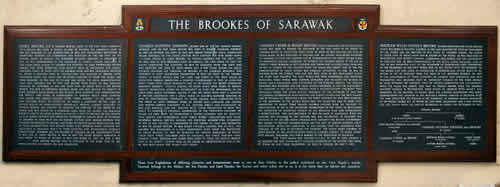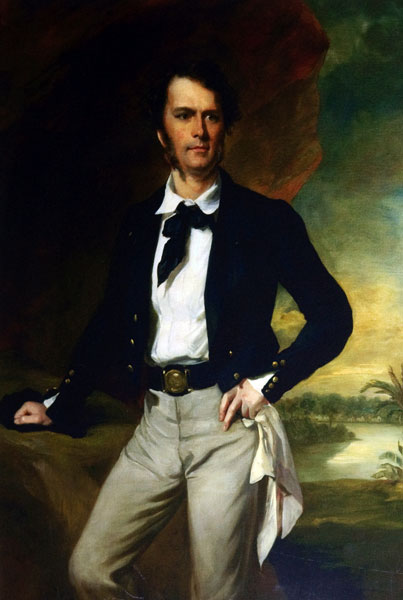
SHEEPSTOR AND THE WHITE RAJAHS OF SARAWAK |
 |
St Leonard's Church , Sheepstor |
From the outside, the little church of St Leonard at Sheepstor is just what you would expect a moorland church to be. Open the door, step inside and, quite literally, you are in another world; all due to the adventurous lives of the Brooke family who made their base in Sheepstor at Burrator House which had been purchased for James Brooke by Baroness Burdett-Coutts "and other admirers" |
SARAWAK
In 1963, Sarawak joined with Malaya and North Borneo to become a new kingdom called Malaysia. Originally these had been the lands of the Sultan of Brunei who had ruled (or tried to rule) over wild tribes whose activities encompassed anything from head hunting to piracy. Thanks to the activities of the Brooke family, this place eventually became a British Protectorate in 1888. The Japanese overran the territory in 1941 and when World War 2 ended, the land became a Crown Colony once again before uniting to become Malaysia. Friendly relations have continued between England and Malaysia, where the four Brookes men are still remembered and honoured. The story of their lives is written on a series of plaques hanging in the church. The story begins with James Brooke. |
 |
| © Richard J. Brine |
1. JAMES BROOKE He said: "Sarawak belongs to the Malays, the Sea Dayaks, the Land Dayaks, the Kayans and other tribes, not to us. It is for them that we labour not ourselves." |
 |
Sir James Brooke who became the first white Rajah of Sarawak © Richard J. Brine |
Transcription of Panel 1: James Brooke, the son of Thomas Brooke, a judge in the East India Company's Civil Service, was born in Bengal in 1803. He enter3ed the Company's Army in 1819 but, wounded in the Burmah Ware of 1825 and honourably mentioned in despatches, resigned his commission and travelled in the far east. On his father's death, he bought the schooner Royalist. Arriving at Singapore in 1839, he was commissioned by the Governor to convey thanks and gifts to the Rajah Muda Hassim of Sarawak for kindness to some shipwrecked British sailors, and after surveying over seventy miles of uncharted and almost unknown coast, he sailed into the Sarawak River and was graciously received. He found a country torn by insurrrection and ravaged by pirates. After venturing along the coast and up rivers, learning to know the people and their problems, he was able so to help and advise the local administrators that they implored him to stay and become their Rajah. He was formally installed on September 24 1841, and from then he began, with a few British friends, the task of fostering peaceful trade and just dealing to subjects of many different races whom he was to rule with sympathy and understanding, for twenty two years. He endeavoured to suppress piracy, head-hunting, and slavery and greatly reduced inter-tribal warfare. To the native laws and customs, which he respected, he added a simplified British Code of Justice which he administered personally, making himself available to anyone seeking his counsel. He devoted his fortune to the needs of his people and was helped by a generous loan from his friend the baroness Burdett-Coutts. He never married. In 1848, he visited England and was created KCB by Queen Victoria and appointed Governor of Labuan. When he returned to Sarawak, he took with him his nephew, Captain John Brooke Johnson, who changed his surname to Brooke, and whom he created Rajah Muda and his heir. In their unremitting and selfless work, they endured many dangers but succeeded in bringing peace to their country and development without exploitation. Sarawak was recognised by America as an Independent State in 1850 and by Great Britain in 1864. In 1859, the Rajah came to live in Burrator House in this parish to which he retired in 1863 and where he died on June 11 1868.
John Brooke Brooke died in England in the same year as his uncle, leaving an infant son and daughter. |
| CONTINUED |
© M.E. Brine. This page last updated
26 August, 2011
|